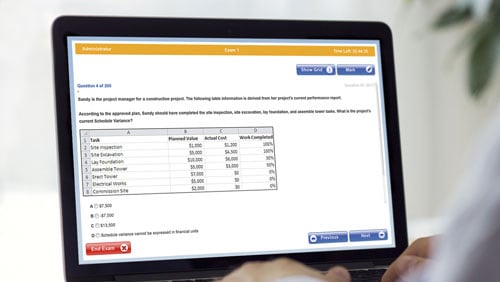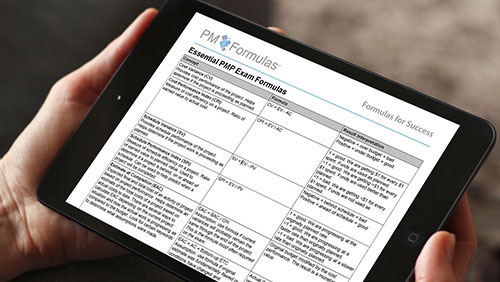Guide to Those Who Failed the PMP® Exam
We recently released a new and much more in-dept article in which we included more than a dozen tips and suggestions about what to do if you failed your PMP exam. Please click below to read it:
Failed PMP Exam: How to Recover.
 The Project Management Professional (PMP)® Exam is not an easy exam. It is a four-hour, 200-question multiple choice exam. Out of these 200 questions you will have to answer 106 correctly in order to pass. However, candidates fail. It happens every day of every week. Yet, knowing that it happens is little or no consolation if the person who fails is you. OK...so you have failed...what can you do now?
The Project Management Professional (PMP)® Exam is not an easy exam. It is a four-hour, 200-question multiple choice exam. Out of these 200 questions you will have to answer 106 correctly in order to pass. However, candidates fail. It happens every day of every week. Yet, knowing that it happens is little or no consolation if the person who fails is you. OK...so you have failed...what can you do now?
Let's start at the beginning. After the exam you will be handed a score report that doesn't just show that you failed, it also gives you an indication about your proficiency level for each of the performance domains. There are three possible levels: Proficient, Moderately Proficient, and Below Proficient. Each of the performance domains contains a different number of questions on the exam and you can now see your proficiency level in each of these domains. This is important information for you so that you can prepare properly for next time. Because you know where you were not proficient you can better focus your future studies.
If by reviewing your score you believe that there was a mistake you can challenge the result. The PMP® credential program is administered and supervised by the Certification Program Manager of Project Management Institute (PMI)®. All challenges are governed by the comprehensive and exclusive rules of the PMI® Certification Governance Council’s (CGC) Certification Appeal Procedures. This appeal process is the only method to review all decisions made by the PMI Certification Program Department regarding applications, eligibility, examinations, test administration and results, and other application or testing-related certification issues. You may now challenge your result by downloading the appeals procedure from the PMI website and submitting your appeal.
The better option, certainly, is to retake the exam. Since you have not passed the exam on your first attempt you may now re-test up to two more times within your one-year eligibility period by submitting a completed re-examination form and paying the associated re-examination fee (currently $275 for PMI members). I recommend strongly that you immediately re-register and give yourself about one month of time to review all your study materials. During this time you should focus on two primary areas:
First, focus on those performance domains in which you did not receive a proficient score. Those are your problem areas and consequentially those are the ones you should be working on.
Second, sign up for an online exam simulator. While this will cost you some extra money but now is not the time to try and be cheap. Now is the time to practice your exam taking techniques. Before the Olympics every athlete will be practicing their sport again and again. Well, your "sport" is taking the PMP exam. So practice it as often as you possibly can. The best way to do this is through an online exam simulator.
If worst comes to worst and you fail a second and then a third time then you will have to wait one year from the date of your last test before re-applying and attempting to test again. If your one-year eligibility period expires without having passed the examination you must re-apply for the credential. Re-examination applications can be filed online or on paper.
You will find a lot of details about the exam taking process and re-examination in the PMP Credentials Handbook. You can find it on the PMI website at the following URL: http://www.pmi.org/Certification/~/media/PDF/Certifications/pdc_pmphandbook.ashx.
And what is the best way not to fail? Read the PMBOK® Guide at least twice, have a sound study plan while also taking a lot of sample tests, and you should also use a good PMP preparation workbook or an audio seminar like The PM PrepCast.
Watch this YouTube video to guide you in choosing the best PMP Exam Simulator:
You can also work with a PMP® Exam coach to assess your needs, determine where you lack knowledge and recommend a study plan for you. In this way you know exactly where you stand and what the best (and usually fastest) way is for you to study and pass the PMP exam.


